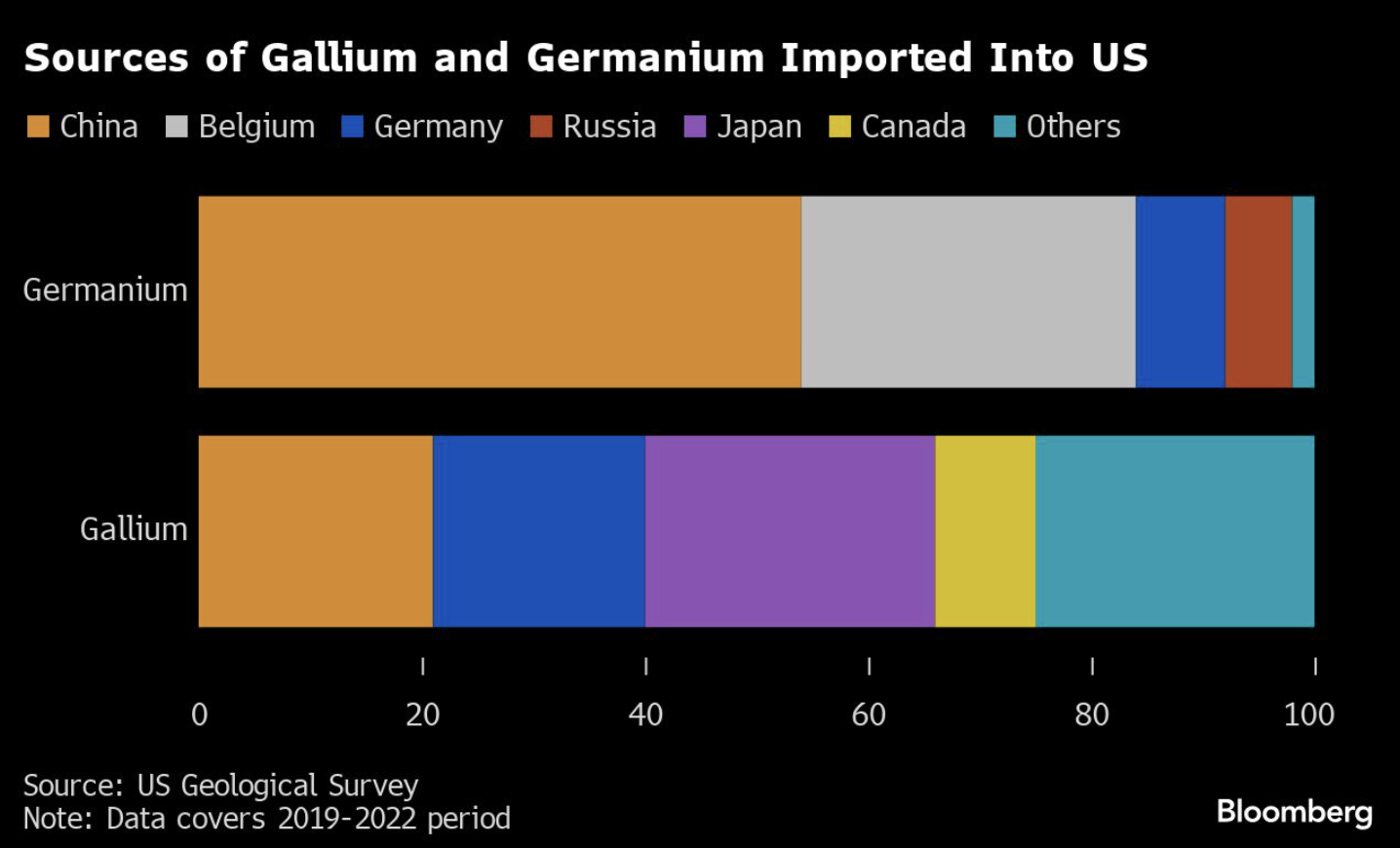China has banned exports of “dual-use items” related to gallium, germanium, antimony, and superhard materials to the United States. The Chinese government has announced that it will halt exports of several key materials used in advanced semiconductors and military technologies to the United States. Additionally, China is reportedly considering a ban on graphite exports. This move comes just one day after the Biden-Harris administration imposed broader restrictions on the sale of advanced semiconductors to China. This is not the first time China has restricted exports to the U.S. and its allies; in 2010, for example, China placed a two-month embargo on rare earth metal exports to Japan during a territorial dispute between the two nations. China is a dominant supplier of critical minerals used in the production of advanced technologies like semiconductors having control of most of the world’s supply.
In the past year, China has implemented a legal framework to control exports of gallium and germanium—vital materials for semiconductors—and, in September, expanded the list to include antimony, a metal used in military explosives. Furthermore, starting in October, China required its exporters of rare earth metals to disclose how these materials would be used in Western supply chains. A year ago, China briefly suspended exports of gallium and germanium until it established a system to approve these transactions. This forced the U.S. to rely more on semi-processed materials purchased from other countries, like Japan, which sources directly from China.
The Chinese export ban also includes super-hard materials, including diamonds and synthetic compounds known for their extreme density and incompressibility. These materials are used in industries such as cutting tools, disc brakes, and protective coatings. The ban likely includes tungsten, a critical material for making armor-piercing ammunition. Guardian Metal Resources, a company based in London, plans to begin tungsten mining in Nevada, but it will take nearly three years to establish the mine. Meanwhile, the Biden-Harris administration imposed a 25% tariff on tungsten imports from China to encourage U.S. manufacturers to seek more stable suppliers.
According to the U.S. Geological Survey, China currently provides 54% of the U.S.’s germanium needs, a key component in infrared technology and fiber optics. Gallium, used in semiconductors, has not been mined in the U.S. since 1987. As a result, the U.S. imports gallium from Japan (26%), China (21%), and Germany (19%), along with other smaller suppliers. Although the U.S. has domestic deposits of these minerals, they have not been mined in large quantities, though some projects are now exploring ways to extract them. For example, researchers are working to extract valuable elements from an old coal mine in West Virginia and a lignite mine in North Dakota. Additionally, Perpetua Resources is developing an antimony mine in Idaho with support from the U.S. government, which awarded the company a $510,500 grant from the Department of Defense. At present, China, Russia, and Tajikistan control 90% of the global antimony supply.
Antimony is commonly referred to as “the loneliest element” since it is almost exclusively produced alongside other minerals, as a byproduct. Mineral mines often produce in this manner, which means the more mining that occurs in a nation, the more subsidiary minerals there are to be produced.

The export restrictions have had a mixed impact on prices for those critical minerals, with the price of antimony more than doubling year to over $25,000 per ton. Prices for gallium, germanium, and graphite also have mostly increased.
Recently, the Biden-Harris administration expanded its curbs on technology to China by prohibiting the sale of certain types of chips and machinery and adding 140 Chinese companies to a restricted trade list. According to Biden-Harris administration officials, the limits were a routine action to update existing curbs and close loopholes that some businesses had used to circumvent restrictions.
It was the third significant action in the past three years as the Biden-Harris administration tried to prevent China from catching up to the United States in developing advanced chips for military equipment and artificial intelligence. The Biden administration has steadily expanded other restrictions on doing business with China, such as curbing U.S. investment in certain Chinese industries and blocking Chinese electric vehicles to support U.S. automakers and to prevent China from obtaining data from Chinese EV operating systems.
President-Elect Trump has also promised aggressive measures to further cut trade with China or to make it operate on a more level playing field. He has campaigned to add tariffs of 60 percent or more on Chinese products and remove so-called permanent normal trade relations with China, resulting in higher tariffs on Chinese goods.
Conclusion
China is dominating the production and processing of critical minerals vital to “green” and military technologies and has recently banned exports of gallium, germanium, antimony, and superhard materials to the United States. The Chinese government controls the supply chains of the critical minerals and rare-earth elements through subsidies, slave labor, and purchases of ore in Africa and Latin America. By making it harder to mine for these minerals in the United States and requiring the use of “green” technologies, the Biden-Harris administration is helping China expand its market power. The United States must advance and implement policies that reduce U.S. reliance on China’s economy, which President-Elect Trump has campaigned to do.